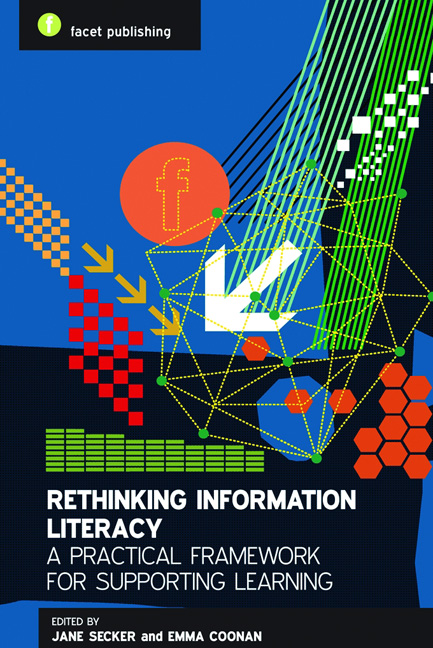Book contents
- Frontmatter
- Contents
- Acknowledgements
- Contributor profiles
- Introduction
- Strand One Transition from school to higher education
- Strand Two Becoming an independent learner
- Strand Three Developing academic literacies
- Strand Four Mapping and evaluating the information landscape
- Strand Five Resource discovery in your discipline
- Strand Six Managing information
- Strand Seven The ethical dimension of information
- Strand Eight Presenting and communicating knowledge
- Strand Nine Synthesizing information and creating new knowledge
- Strand Ten The social dimension of information
- Afterword: ‘Ownership is a flawed concept’
- Conclusion
- Appendix 1 A New Curriculum for Information Literacy (ANCIL): the curriculum
- Appendix 2 ANCIL Lesson Plan
- Appendix 3 ANCIL Institutional Audit: worksheet
- Appendix 4 ANCIL Institutional Audit: interview questions
- Index
- Miscellaneous Endmatter
- Miscellaneous Endmatter
- Miscellaneous Endmatter
- Miscellaneous Endmatter
Strand Four - Mapping and evaluating the information landscape
Published online by Cambridge University Press: 08 June 2018
- Frontmatter
- Contents
- Acknowledgements
- Contributor profiles
- Introduction
- Strand One Transition from school to higher education
- Strand Two Becoming an independent learner
- Strand Three Developing academic literacies
- Strand Four Mapping and evaluating the information landscape
- Strand Five Resource discovery in your discipline
- Strand Six Managing information
- Strand Seven The ethical dimension of information
- Strand Eight Presenting and communicating knowledge
- Strand Nine Synthesizing information and creating new knowledge
- Strand Ten The social dimension of information
- Afterword: ‘Ownership is a flawed concept’
- Conclusion
- Appendix 1 A New Curriculum for Information Literacy (ANCIL): the curriculum
- Appendix 2 ANCIL Lesson Plan
- Appendix 3 ANCIL Institutional Audit: worksheet
- Appendix 4 ANCIL Institutional Audit: interview questions
- Index
- Miscellaneous Endmatter
- Miscellaneous Endmatter
- Miscellaneous Endmatter
- Miscellaneous Endmatter
Summary
Strand Four focuses on developing students’ awareness of the range of academic information formats available, together with their characteristics and their relative benefits. These include traditional formats such as monographs, textbooks and peer-reviewed journal articles, but in the digital age also embrace researcher blogs, open access journals and preprint repositories as well as open web pages.
A significant element in this strand is equipping students with the ability not only to recognize the variety of formats available and where and how to find them, but also to evaluate their appropriateness in the context of a specific task – e.g. an essay, a presentation, a dissertation. As in other strands, the focus is on enabling students to go beyond directed learning and achieve independent competence, mapping out the landscape of their subject for themselves and understanding the changing features of the information types within it.
We met Clare at the first of a series of workshops we delivered on ANCIL in 2011 and 2012, and were immediately struck by her work. Not only is she a prolific and articulate advocate of a broad, holistic view of information literacy, but her research into partnerships and communities of practice in higher education aligns very closely with ANCIL's interprofessional vision. Here she describes how this approach has enhanced students’ understanding of the information landscape in education.
Institutional context
York St John University is a higher education institution with approximately 6000 students and 600 staff. Students study in one of four faculties/schools: the Faculty of Education and Theology, Faculty of Arts, Faculty of Health and Life Sciences or the York St John Business School. This case study takes place in the Faculty of Education and Theology, which is the largest in the university in terms of student numbers.
The library service is part of a converged team with ICT, referred to as Information Learning Services, and sits in the resources stream, along with facilities. Four academic support librarians work to bridge the gap to the faculties, which sit in the academic stream, one per faculty.
The approach outlined here is aligned with Initial Teacher Education courses, specifically the undergraduate BA(Hons) in Primary Education.
- Type
- Chapter
- Information
- Rethinking Information LiteracyA practical framework for supporting learning, pp. 41 - 54Publisher: FacetPrint publication year: 2012

